Grant for transport engineering project to Hussam Nour-Eldin
DynaMo researcher Associate Professor Hussam Nour-Eldin intends to increase competitiveness in Danish animal production by replacing part of the annual 20 million tons soybean import to Denmark with locally grown oil seed rape crops. The Danish Council for Independent Research supports his project with 2.6 mill dkk.

The protein-rich rape seeds have limited use as feed due to toxic defence compounds.
80% of Europe’s protein feed supply comes from an environmentally and socioeconomically unsustainable production of soybean in South America.
Enhanced utilization of rape meal
Seed meals from oilseed rape grown locally have the potential to replace the expensive soybean meal in animal production, but their use is hampered by the accumulation of the anti-nutritional glucosinolates that are the defense compounds of the rape plants.
Thanks to a grant from the Danish Council for Independent Research, researchers at DynaMo Center will now seek to solve this challenge.
Grant recipient Associate Professor Hussam Nour-Eldin explains:
'We wish to employ the novel concept of transport engineering as a biotechnological tool to eliminate glucosinolates from seeds of the worlds 3rd largest oilseed crop that is grown locally in the Northern hemisphere.'
From model plant to crops
Recently, DynaMo researchers identified two glucosinolate transporters essential for accumulation of glucosinolates in the seeds of the model plant Arabidopsis thaliana (published in Nature, August 2012).
Elimination of the transporters resulted in plants with glucosinolate-free seeds and increased glucosinolate levels in vegetative parts indicating improved defense capabilities.
This project aimes at translating this scientific breakthrough from model plant to crops and to test the effects of transport engineering on yield and resistance.
By applying this new technology in plant breeding, the project has the potential to enhance utilization of existing local Danish resources and provide competitive and sustainable production of protein feed.
Research at high international level
The grant is awarded within the framework of the Danish Council for Independent Research’s E2015 and F2016 call, with the aim of providing researchers in Denmark the best possible conditions for producing outstanding research results at a high international level.
In total, The Danish Council for Independent Research - Technology and Production Sciences awarded 35 DFF-Research Project Grants to researchers in Denmark to the sum of approximately DKK 161 million.
Related News
Contact

Associate Professor Hussam Nour-Eldin
DynaMo Center
Department of Plant and Environmental Sciences
University of Copenhagen
huha@plen.ku.dk
35 33 36 98
The grant
Project Title
Enhancing nutritional value of locally-grown protein feed by transport engineering
Awarded Amount
DKK 2,592,000
From
Danish Council for Independent Research | Technology and Production Sciences
